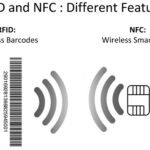Technology is rapidly advancing, but is it impacting our personal data? Pioneer-technology.com explores the concerns, benefits, and trade-offs of data collection. We aim to provide clarity and empower you to navigate the digital landscape safely with reliable information and proactive solutions. Learn about data security, privacy policies, and digital footprints.
 A young businessman in office building at night looking at smartphone, window view, Milan, Italy
A young businessman in office building at night looking at smartphone, window view, Milan, Italy
1. How Much of Your Life is Being Tracked by Technology?
Unfortunately, most Americans feel their online and offline activities are regularly monitored by companies and the government. It’s become such a prevalent aspect of modern life that nearly six in ten U.S. adults believe it’s impossible to navigate daily life without companies or the government collecting data about them.
This widespread tracking raises concerns about personal autonomy and the potential for misuse of information. As technology becomes increasingly integrated into our daily routines, understanding the extent of this monitoring is crucial for informed decision-making and safeguarding our digital privacy.
1.1 What Data Does the Government Collect and Access?
The government collects various personal details, including tax, employment, physical attributes (from government IDs), financial circumstances (if receiving benefits), health information (through government insurance), addresses, household details, property ownership, and education records (for student loans).
National security organizations also monitor phone traffic and movements. Law enforcement can access phone records, health records (including genetic data), online browsing, search queries, texts, emails, and social media activity with subpoenas or warrants. While there are limitations on how government agencies share data, understanding the breadth of data collection is vital for informed civic engagement.
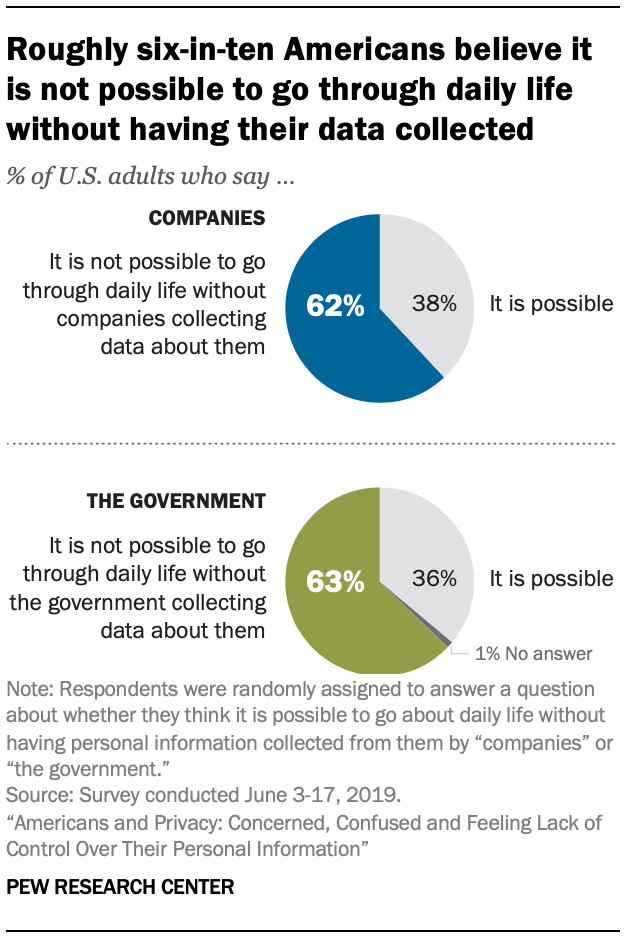 Roughly six-in-ten Americans believe it is not possible to go through daily life without having their data collected
Roughly six-in-ten Americans believe it is not possible to go through daily life without having their data collected
1.2 How Do Companies Track Your Data?
Companies track online activities through cookies, tracking pixels, and website analytics to monitor browsing behavior, purchase history, and demographics. Offline tracking includes location data from mobile devices, purchase information from loyalty programs, and demographic data collected during transactions.
Companies use this data to personalize advertising, tailor content, and optimize marketing strategies. According to research from Stanford University’s Department of Computer Science, in July 2025, targeted advertising will account for 75% of all digital advertising revenue. Understanding these tracking methods is vital for protecting your digital footprint.
1.3 What are the Risks and Rewards of Data Collection and Profiling?
While data-driven products and services promise time and money savings, even better health and well-being, many Americans are not convinced of the benefits of widespread data gathering. 81% of the public feels the potential risks of company data collection outweigh the benefits, and 66% feel the same about government data collection. A majority are concerned about how companies (79%) and the government (64%) use their data.
On the other hand, according to pioneer-technology.com, data collection can lead to personalized experiences, efficient services, and societal benefits like improved healthcare and public safety. Striking a balance between these risks and rewards requires informed consent, transparency, and robust data protection measures.
2. Do You Feel In Control Of Your Personal Data?
Most Americans feel they have little control over their data collected by the government (84%) or companies (81%). Control varies by data type; while few feel in control of their physical location or social media posts, about half feel they lack control over who accesses their search terms (48%) and visited websites (41%).
This lack of control can erode trust in institutions and online platforms. Enhancing transparency, providing user-friendly privacy settings, and empowering individuals to manage their data are essential steps toward restoring a sense of control.
2.1 How Can You Take Back Control of Your Data?
To take back control of your data, start by adjusting privacy settings on social media, web browsers, and mobile devices to limit data collection. Use privacy-focused browsers, search engines, and VPNs to minimize tracking. Review privacy policies and terms of service before using new apps or services. According to pioneer-technology.com, being proactive about your digital footprint is critical for maintaining control.
2.2 What are the Best Tools for Protecting Your Privacy?
Several tools can help protect your privacy. Virtual Private Networks (VPNs) encrypt internet traffic and mask your IP address. Privacy-focused browsers like Brave and DuckDuckGo block trackers and ads. Password managers create and store strong, unique passwords. According to cybersecurity experts at pioneer-technology.com, using these tools enhances online anonymity and security.
 Majority of Americans feel as if they have little control over data collected about them by companies and the government
Majority of Americans feel as if they have little control over data collected about them by companies and the government
2.3 How Can You Advocate for Better Data Privacy Laws?
Advocating for better data privacy laws involves contacting your elected officials to express your concerns and support legislation that strengthens data protection. Support organizations like the Electronic Frontier Foundation (EFF) that champion digital rights. Staying informed about current privacy debates and participating in public discussions is key. Pioneer-technology.com encourages active civic participation to shape data privacy policies.
3. What Are The Acceptable Uses of Your Data?
Despite general concerns, Americans find data use acceptable in certain contexts. A 49%-27% margin supports sharing data from poorly performing schools with nonprofits to improve educational outcomes. Similarly, 49% find it acceptable for the government to collect data to assess potential terrorist threats, compared to 31% who find it unacceptable.
However, more find it unacceptable for social media companies to monitor posts for signs of depression (45% vs. 27%) or for smart speaker companies to share audio recordings with law enforcement (49% vs. 25%). Fitness tracking app makers sharing user data with medical researchers is more evenly divided.
3.1 When is Data Collection Ethical?
According to pioneer-technology.com, ethical data collection occurs when individuals provide informed consent, data is used transparently, and benefits outweigh risks. Data should be anonymized and used for purposes that align with public interest, such as medical research or improving public services. Ethical frameworks should prioritize individual privacy and autonomy while enabling innovation.
3.2 What are the Boundaries of Data Collection for Security Purposes?
According to legal experts at pioneer-technology.com, data collection for security purposes should be limited, proportionate, and subject to strict oversight. Data should only be collected when there is a reasonable suspicion of criminal activity or a credible threat to national security. Transparency and accountability are crucial to prevent abuse.
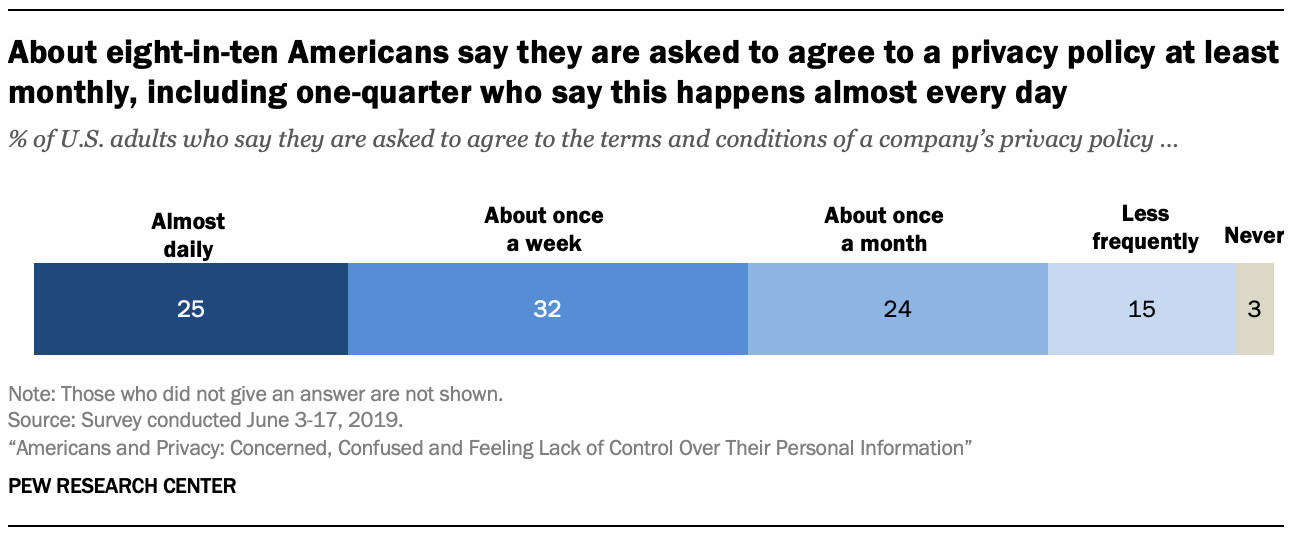 About eight-in-ten Americans say they are asked to agree to a privacy policy at least monthly, including one-quarter who say this happens almost every day
About eight-in-ten Americans say they are asked to agree to a privacy policy at least monthly, including one-quarter who say this happens almost every day
3.3 How Can Data Be Used to Improve Society Without Violating Privacy?
According to data scientists at pioneer-technology.com, data can improve society through anonymization, aggregation, and secure data enclaves. These methods allow researchers and policymakers to analyze trends and develop solutions without compromising individual privacy. Balancing societal benefits with privacy protections is essential for responsible data use.
4. How Concerned Should You Be About Data Usage?
79% of adults are very or somewhat concerned about how companies use their data, while 64% have similar concerns about government data collection. About four-in-ten are concerned about the personal information social media sites (40%) or advertisers (39%) might know.
Most Americans are not confident that companies will admit mistakes (79%), be held accountable (75%), or use data in ways people feel comfortable with (69%). According to pioneer-technology.com, vigilance and advocacy are crucial for holding companies and governments accountable.
4.1 What are the Potential Consequences of Data Misuse?
Potential consequences of data misuse include identity theft, financial fraud, discrimination, and privacy violations. Data breaches can expose sensitive personal information, leading to significant harm. Data misuse can also erode trust in institutions and online platforms. Pioneer-technology.com emphasizes the importance of robust data protection measures to mitigate these risks.
4.2 How Can You Recognize and Avoid Scams That Exploit Your Data?
To recognize and avoid scams, be wary of unsolicited emails, calls, or messages requesting personal information. Verify the legitimacy of requests by contacting the organization directly. Use strong, unique passwords and enable two-factor authentication. According to cybersecurity experts at pioneer-technology.com, staying informed about common scams and practicing caution can help protect your data.
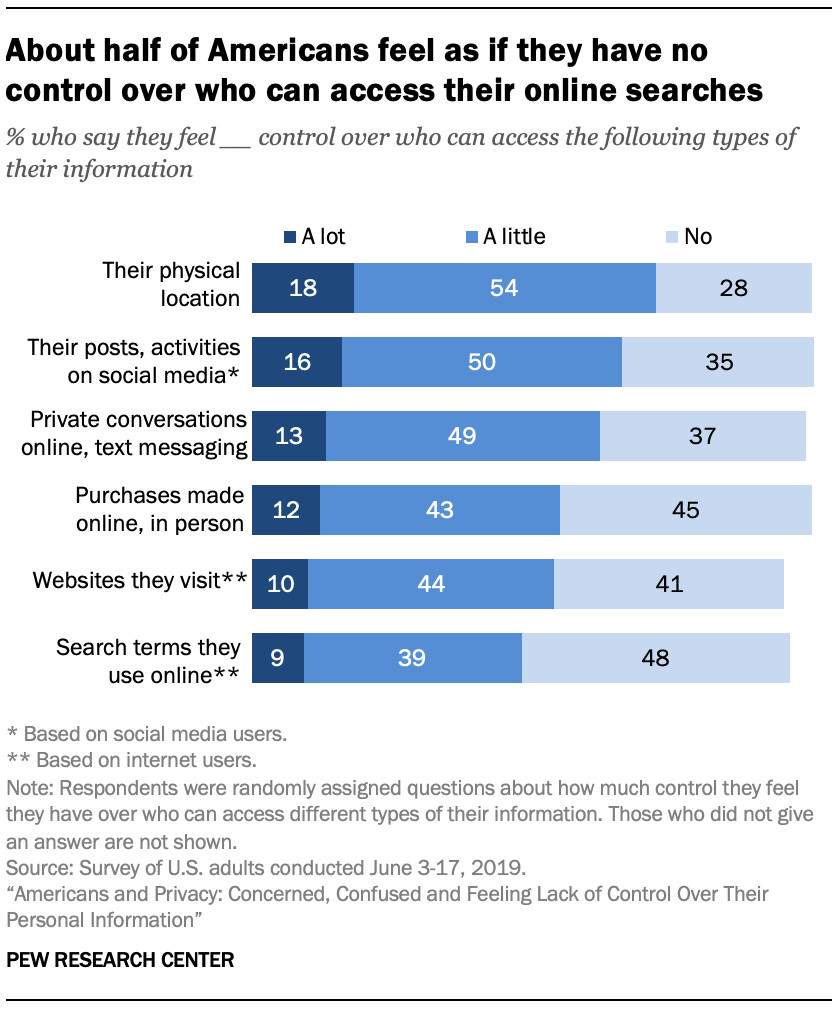 About half of Americans feel as if they have no control over who can access their online searches
About half of Americans feel as if they have no control over who can access their online searches
4.3 What Steps Should You Take if Your Data is Breached?
If your data is breached, immediately change your passwords for all affected accounts. Monitor your credit reports for suspicious activity and consider placing a credit freeze. Report the breach to the relevant authorities and consider enrolling in identity theft protection services. Pioneer-technology.com provides resources and guidance for responding to data breaches effectively.
5. How Well Do You Understand Data Privacy?
78% of U.S. adults say they understand very little or nothing about what the government does with the data it collects, and 59% say the same about company data collection. Only 6% understand a great deal about what companies do with the data, and 4% know a great deal about what the government does. Roughly six-in-ten Americans (63%) have very little or no understanding of privacy laws, with only 3% understanding them a great deal.
According to pioneer-technology.com, enhancing data literacy is crucial for empowering individuals to make informed decisions about their privacy.
5.1 What are the Key Data Privacy Laws You Should Know?
Key data privacy laws include the California Consumer Privacy Act (CCPA), the General Data Protection Regulation (GDPR) in Europe, and the Health Insurance Portability and Accountability Act (HIPAA) for health information. These laws grant individuals rights over their data, including the right to access, correct, and delete personal information. Pioneer-technology.com offers detailed guides on these laws to help you understand your rights.
5.2 How Do Privacy Policies Protect Your Data?
Privacy policies outline how companies collect, use, and protect your data. They should explain what data is collected, how it is used, with whom it is shared, and what security measures are in place. While 97% of Americans are asked to approve privacy policies, only 22% of those who read them, read them entirely. Understanding these policies is crucial for making informed decisions about using online services.
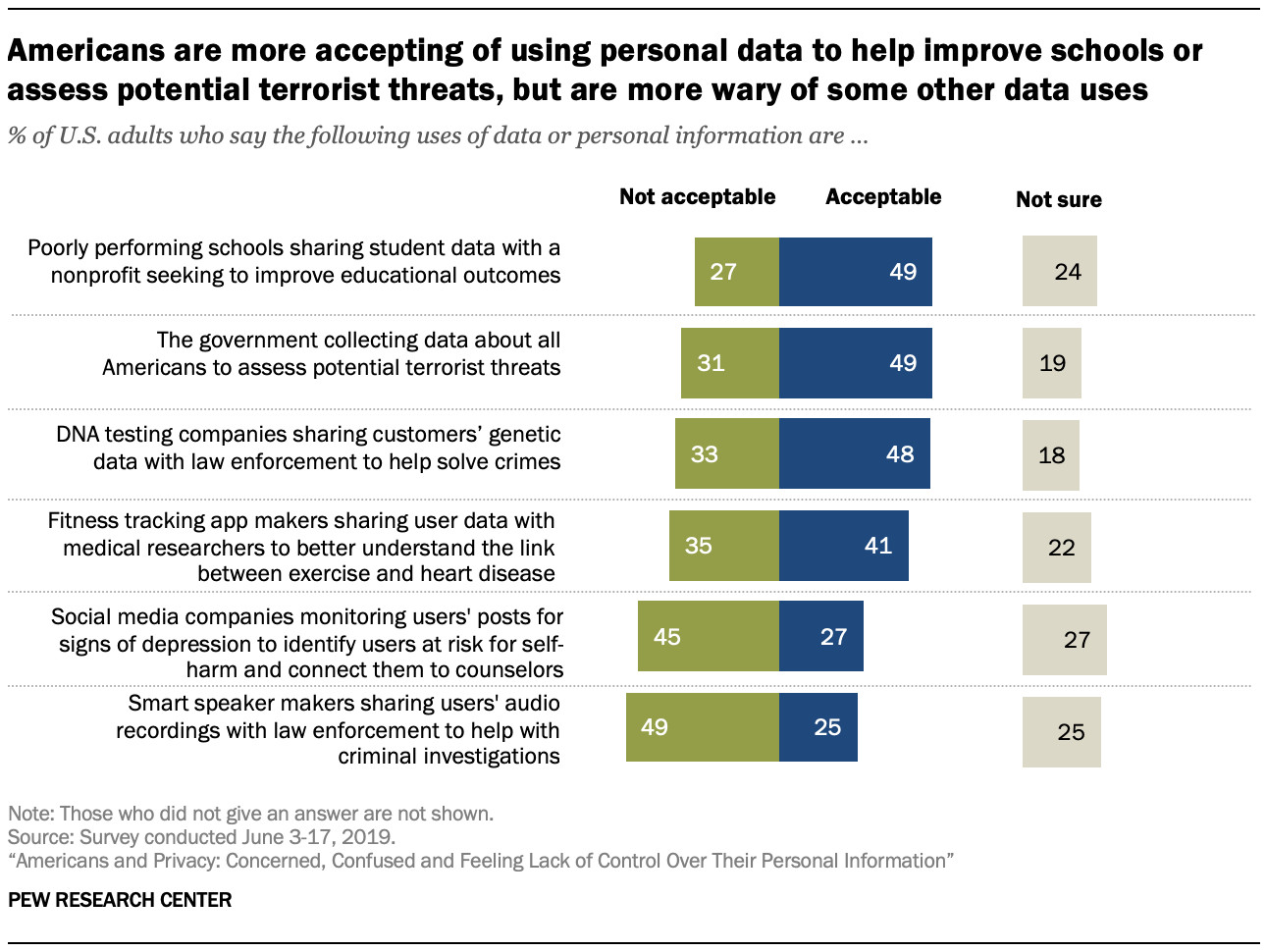 Americans are more accepting of using personal data to help improve schools or assess potential terrorist threats, but are more wary of some other data uses
Americans are more accepting of using personal data to help improve schools or assess potential terrorist threats, but are more wary of some other data uses
5.3 What Resources Can Help You Improve Your Data Literacy?
Numerous resources can help improve your data literacy. Pioneer-technology.com offers articles, guides, and courses on data privacy and security. Organizations like the National Cyber Security Centre provide educational materials and tools. Online courses from universities and platforms like Coursera and edX offer in-depth learning on data science and privacy.
6. How Do Americans Handle Privacy Policies?
While 97% of Americans are asked to approve privacy policies, only 9% always and 13% often read them. About 38% sometimes read them, and 36% never do. Among those who read privacy policies, only a minority (22%) read them completely.
A majority of Americans (57%) are not too confident (40%) or not at all confident (17%) that companies follow their privacy policies. According to pioneer-technology.com, this highlights the need for clearer, more accessible privacy policies and stronger enforcement mechanisms.
6.1 Why Don’t People Read Privacy Policies?
People often don’t read privacy policies due to their length, complexity, and legal jargon. Many believe that their data will be collected regardless, making the effort seem futile. Pioneer-technology.com advocates for simplified, user-friendly policies that highlight key points and choices.
6.2 How Can Privacy Policies Be Made More User-Friendly?
Privacy policies can be made more user-friendly by using plain language, clear headings, and visual aids. Summaries of key points and interactive elements can also improve engagement. Pioneer-technology.com recommends that companies prioritize transparency and accessibility in their privacy policies.
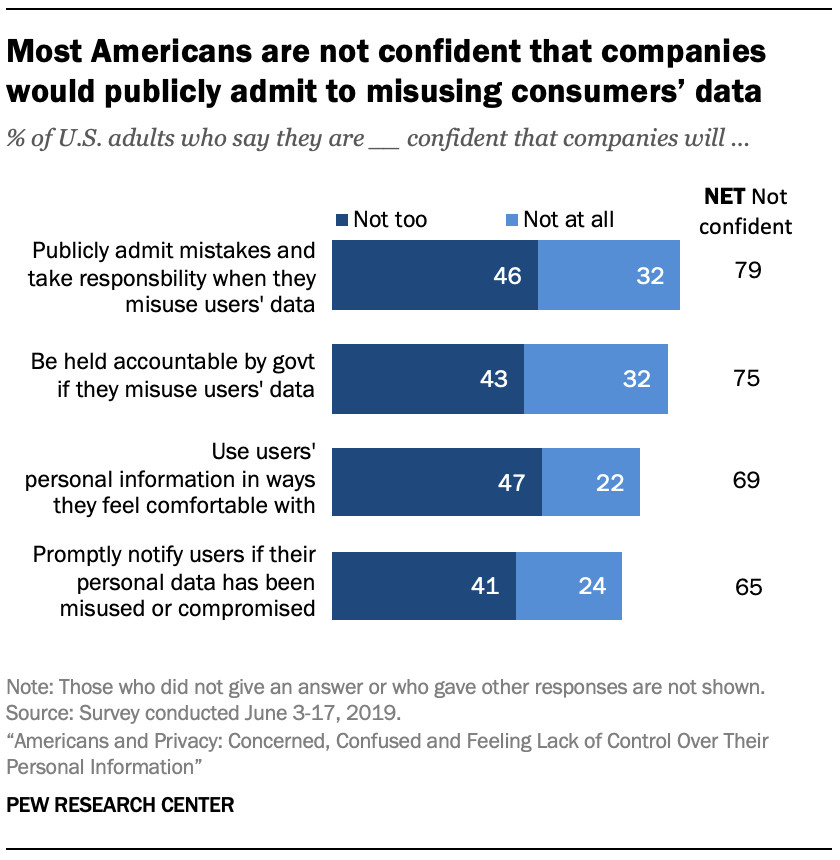 Most Americans are not confident that companies would publicly admit to misusing consumers’ data
Most Americans are not confident that companies would publicly admit to misusing consumers’ data
6.3 What Alternatives Exist to Traditional Privacy Policies?
Alternatives to traditional privacy policies include standardized privacy labels, privacy dashboards, and consent management platforms. These tools provide users with more control and transparency over their data. Pioneer-technology.com explores innovative approaches to data privacy and empowers individuals to take control.
7. What Are the Real-World Consequences of Privacy Issues?
Roughly three-in-ten Americans (28%) have experienced at least one major identity theft problem in the past year: 21% had fraudulent charges on their credit or debit card, 8% had social media or email accounts taken over, and 6% had someone try to open a credit line or get a loan in their name. A majority of U.S. adults (57%) follow privacy news closely.
These statistics highlight the tangible risks and underscore the importance of staying informed and proactive about data privacy. Pioneer-technology.com provides timely updates and actionable advice to help you protect yourself.
7.1 What is Identity Theft and How Can You Prevent It?
Identity theft involves someone using your personal information without your permission for financial gain. To prevent it, monitor your credit reports, use strong passwords, enable two-factor authentication, and be cautious about sharing personal information online. Pioneer-technology.com offers comprehensive resources on identity theft prevention.
7.2 How Can Data Breaches Impact Your Financial Security?
Data breaches can expose your financial information, leading to fraudulent charges, unauthorized withdrawals, and identity theft. To protect your financial security, monitor your accounts regularly, set up fraud alerts, and consider using credit monitoring services. Pioneer-technology.com provides expert advice on safeguarding your finances after a data breach.
7.3 What Are the Psychological Effects of Privacy Violations?
Privacy violations can lead to anxiety, stress, and a sense of vulnerability. Victims may experience feelings of helplessness, anger, and distrust. Pioneer-technology.com recognizes the psychological impact of privacy violations and advocates for greater empathy and support for victims.
8. How Do Age and Ethnicity Affect Privacy Concerns?
Older Americans are less likely to feel in control of their physical location, purchases, and conversations compared to younger adults. They are also less likely to believe they benefit from data collection. However, older Americans are more likely to support law enforcement using genetic data, data collection for terrorist threats, and smart speaker recordings in investigations. Conversely, younger adults are more likely to support social media monitoring for depression signs and fitness tracking data sharing with medical researchers.
Black Americans are more likely than white Americans to believe the government tracks their online and offline activities. Black and Hispanic adults are more concerned about what law enforcement, employers, family, and friends know about them. Black adults are also more likely to have social media or email accounts taken over. White adults report feeling less control over their online and offline purchases.
8.1 How Do Different Generations View Data Privacy?
Different generations have varying perspectives on data privacy. Younger generations tend to be more comfortable sharing data for personalized experiences, while older generations prioritize privacy and security. Pioneer-technology.com explores these generational differences and offers insights for bridging the gap.
8.2 Are There Disparities in Privacy Protection Based on Race and Ethnicity?
Yes, there are disparities in privacy protection based on race and ethnicity. Minority communities are often disproportionately affected by data breaches and identity theft. Pioneer-technology.com advocates for equitable data protection measures that address these disparities.
8.3 How Can Privacy Education Be Tailored to Different Demographics?
Privacy education should be tailored to different demographics by considering their unique needs and concerns. Targeted messaging and culturally relevant examples can improve engagement and understanding. Pioneer-technology.com emphasizes the importance of inclusive privacy education that reaches all communities.
9. How is Pioneer-Technology.com Addressing Privacy Concerns?
At pioneer-technology.com, we understand the growing concerns surrounding technology and privacy. We strive to be your trusted resource for navigating this complex landscape by offering clear, comprehensive, and up-to-date information on data privacy. We aim to empower you to make informed decisions about your digital footprint and advocate for stronger data protection measures.
9.1 What Resources Does Pioneer-Technology.com Offer on Data Privacy?
Pioneer-technology.com offers a wealth of resources on data privacy, including:
- In-depth articles on data collection practices, privacy laws, and security tools.
- Guides on adjusting privacy settings on popular platforms and devices.
- Reviews of privacy-focused browsers, VPNs, and password managers.
- News updates on data breaches, privacy violations, and policy changes.
We are committed to providing you with the knowledge and tools you need to protect your privacy in the digital age.
9.2 How Does Pioneer-Technology.com Ensure the Accuracy and Reliability of Its Information?
We adhere to strict editorial standards to ensure the accuracy and reliability of our information. Our team of experts thoroughly researches and verifies all content, drawing from reputable sources such as academic studies, government reports, and industry publications. We also consult with privacy experts and legal professionals to ensure our information is accurate and up-to-date.
9.3 How Can You Stay Updated on the Latest Privacy Trends and News?
Stay updated on the latest privacy trends and news by:
- Visiting pioneer-technology.com regularly for new articles and updates.
- Subscribing to our newsletter for curated privacy news and tips.
- Following us on social media for real-time updates and discussions.
We are committed to keeping you informed and empowered to navigate the ever-evolving privacy landscape.
10. What Actions Can You Take Right Now to Protect Your Privacy?
Protecting your privacy is an ongoing process that requires vigilance and proactive measures. Here are some immediate actions you can take:
- Review and adjust your privacy settings: Take the time to review and adjust your privacy settings on social media, web browsers, and mobile devices. Limit data collection and sharing to what you are comfortable with.
- Use strong, unique passwords: Create strong, unique passwords for all your online accounts and store them securely using a password manager.
- Enable two-factor authentication: Whenever possible, enable two-factor authentication to add an extra layer of security to your accounts.
- Be cautious about sharing personal information: Be wary of sharing personal information online, especially on social media and through email.
- Use a VPN: Use a Virtual Private Network (VPN) to encrypt your internet traffic and mask your IP address.
- Stay informed: Stay informed about the latest privacy threats and best practices by visiting pioneer-technology.com and following reputable privacy news sources.
| Action | Description |
|---|---|
| Review Privacy Settings | Limit data collection on social media, browsers, and devices. |
| Use Strong Passwords | Create unique passwords and use a password manager. |
| Enable Two-Factor Auth | Add extra security to your accounts. |
| Be Cautious Sharing Info | Limit personal information shared online. |
| Use a VPN | Encrypt internet traffic and mask your IP address. |
| Stay Informed | Follow pioneer-technology.com for updates on privacy threats and best practices. |
10.1 What are the First Steps to Take After Reading This Article?
After reading this article, take the following steps:
- Assess your current privacy practices: Reflect on your current privacy practices and identify areas for improvement.
- Prioritize your privacy goals: Determine what aspects of your privacy are most important to you and focus your efforts accordingly.
- Take action: Implement the steps outlined in this article to protect your privacy and stay informed about privacy trends and news.
- Share this information: Share this article with your friends, family, and colleagues to raise awareness about data privacy and encourage them to take action.
By taking these steps, you can start taking control of your privacy and navigating the digital world with confidence.
10.2 How Can You Make Privacy a Habit?
Making privacy a habit requires consistent effort and awareness. Here are some tips:
- Set reminders: Set reminders to regularly review your privacy settings and update your passwords.
- Incorporate privacy into your daily routine: Make privacy a part of your daily routine by using privacy-focused tools and services.
- Educate yourself continuously: Stay informed about the latest privacy threats and best practices by reading articles, attending webinars, and following privacy experts on social media.
- Be mindful of your digital footprint: Be aware of the information you share online and take steps to minimize your digital footprint.
With consistent effort and awareness, you can make privacy a habit and protect your personal information in the digital age.
10.3 What Long-Term Strategies Can Help Protect Your Privacy?
Long-term strategies for protecting your privacy include:
- Supporting privacy-focused legislation: Contact your elected officials to express your support for stronger data protection laws.
- Advocating for transparency and accountability: Hold companies and government agencies accountable for their data collection and use practices.
- Investing in privacy-enhancing technologies: Support the development and adoption of privacy-enhancing technologies, such as encryption and anonymization tools.
- Promoting data literacy: Advocate for data literacy education in schools and communities to empower individuals to make informed decisions about their privacy.
By implementing these long-term strategies, you can help create a more privacy-respecting digital world for yourself and future generations.
FAQ: Is Technology Invading Our Privacy?
Here are some frequently asked questions about technology and privacy:
- Is Technology Invading Our Privacy? Yes, technology has significantly increased the potential for privacy invasion through data collection and tracking.
- What is data privacy? Data privacy is the right to control how your personal information is collected, used, and shared.
- Why is data privacy important? Data privacy is important because it protects your personal autonomy, prevents discrimination, and safeguards your financial security.
- What are the biggest threats to data privacy? The biggest threats to data privacy include data breaches, identity theft, and government surveillance.
- How do companies collect my data? Companies collect your data through cookies, tracking pixels, mobile apps, and loyalty programs.
- What can I do to protect my data online? You can protect your data online by using strong passwords, enabling two-factor authentication, and adjusting your privacy settings.
- What are the best privacy-focused browsers? Some of the best privacy-focused browsers include Brave, DuckDuckGo, and Firefox Focus.
- What is a VPN and how does it protect my privacy? A VPN (Virtual Private Network) encrypts your internet traffic and masks your IP address, protecting your privacy online.
- How can I tell if a website is safe and secure? You can tell if a website is safe and secure by looking for the “https” in the URL and a padlock icon in the address bar.
- What should I do if my data is breached? If your data is breached, immediately change your passwords, monitor your credit reports, and report the breach to the authorities.
Ready to take control of your privacy? Visit pioneer-technology.com today to discover more articles, in-depth guides, and the latest technology trends in the US! Address: 450 Serra Mall, Stanford, CA 94305, United States. Phone: +1 (650) 723-2300. Website: pioneer-technology.com.

